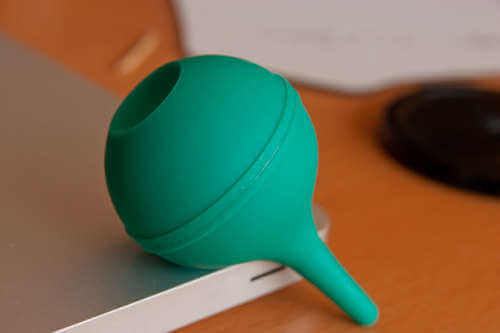Relationship Between Throat Issues and the Intestine


Reviewed and approved by the doctor Nelton Abdon Ramos Rojas
The title of this article may surprise you, but it isn’t the first time surprising relationships between different body parts have been discovered. This article will explain how and why you should take care of your intestine if you suffer from throat issues like tonsillitis, pharyngitis, aphonia, etc.
Old remedies for throat issues
People have had knowledge of medicine for a really long time, and always found simple remedies with what they had available to deal with everyday problems.
With throats issues, especially when children had them over and over again, they didn’t hesitate to use an enema.
Enemas used to be a common solution since they knew that a poorly functioning intestine could lead to many health problems.
And so, as a result, an enema would almost immediately help the situation.
Enemas used to be performed with the help of a rubber bulb, which can still be bought at pharmacies since they are the fastest and most comfortable way to perform one.
- You should fill the bulb with warm water, but not tap water, rather use clean water. Put lubricant or oil on the edge and insert it into the anus while lying on your left side.
- After inserting as much water as you can handle, remove the bulb.
- You can perform a couple of enemas a day while you have a sore throat.

Check your intestine
If you frequently have throat problems for no apparent reason or one that may be difficult to treat, pay attention to your intestine so you can rule out some common conditions:
- Irritable bowel syndrome: a chronic condition that causes pain, diarrhea and/or bouts of constipation. It can be related to nerves or emotions.
- Constipation: it is one of the biggest issues throughout the day, which is mainly from poor nutrition, too many refined foods, and not getting enough physical activity.
- Intestinal parasites: parasites are common, but not very well understood. The best known is candidiasis, but there is a wide range with many symptoms. These can make it difficult to identify the problem. It can make you tired, nervous, have appetite problems, poor digestion, an itchy nose or anus, etc.
- Diverticulitis: this consists of the thickening of spots of the colon wall.
Gut flora
If you really want to take care of your throat, you should care for your intestines and treat any issues that arise. A good place to start is the gut flora, which is easily affected by intestinal problems, poor nutrition, and taking medicine.
You may also like:
Probiotic Foods for a Healthier Gut Flora
You can care for it in two ways:
- Eat foods that promote it, mainly foods like chucrut, yogurt, and kefir, but should be prepared at home to make sure that it hasn’t been artificially modified and that it has the nutrients you need.
- Take a specific supplement to build up the gut flora, especially if you have been taking medication.

Food intolerance
There is an important question you should consider if you have intestinal problems.
You need to assess the likelihood of any sort of food intolerance which could be causing a prolonged and progressive damage.
You can quickly identify when you have an allergy because the reaction is instant. However, it’s not this straightforward with a food intolerance. This has slow and gradual effects that make it slightly more difficult to detect.
You can have an intolerance to any food and many lab tests can determine whether or not you have one. The most common ones that you should keep in mind are gluten and lactose. You can also suffer a food intolerance to certain fruits, nuts, or food additives.
We recommend you also read:
How to Replace the Bread in Sandwiches with Gluten-free Alternatives

Hot foot baths
Even though this remedy doesn’t always help with throat issues, a foot bath can provide immediate relief for a swollen throat. This is because exposing the feet to a high temperature will quickly lower the temperature in the upper body.
Put your feet in hot water for at least 20 minutes. If the water gets cold, add more hot water. Afterward you should cover your feet.
Images courtesy of Pavel Fiskovich, mfcorwin, and didriks.
All cited sources were thoroughly reviewed by our team to ensure their quality, reliability, currency, and validity. The bibliography of this article was considered reliable and of academic or scientific accuracy.
- Macpherson, A. J., & Harris, N. L. (2004). Interactions between commensal intestinal bacteria and the immune system. Nature Reviews Immunology. https://doi.org/10.1038/nri1373
- Parvez, S., Malik, K. A., Ah Kang, S., & Kim, H. Y. (2006). Probiotics and their fermented food products are beneficial for health. Journal of Applied Microbiology. https://doi.org/10.1111/j.1365-2672.2006.02963.x
- Biesiekierski, J. R., Newnham, E. D., Irving, P. M., Barrett, J. S., Haines, M., Doecke, J. D., … Gibson, P. R. (2011). Gluten Causes gastrointestinal symptoms in subjects without celiac disease: A double-blind randomized placebo-controlled trial. American Journal of Gastroenterology. https://doi.org/10.1038/ajg.2010.487
This text is provided for informational purposes only and does not replace consultation with a professional. If in doubt, consult your specialist.








